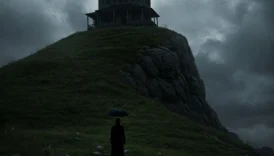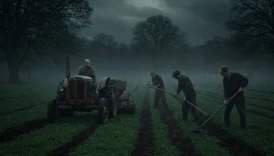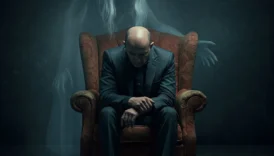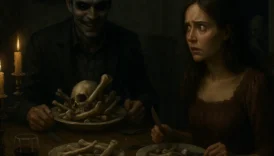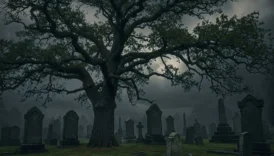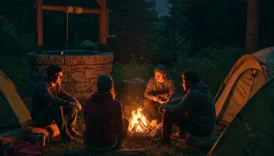The Hüddam’s Grave | A True Horror Story
A True Horror Story: Paranormal events experienced by a young man doing his military service in a supposedly cursed barracks in Diyarbakır. The Hüddam’s grave, the mysterious soldier Mehmet Gök, and terrifying experiences in the eerie pool area…
Like every son of the homeland, I was very excited about going to the military. The place where I would do my basic training was determined; I would start my national duty in Çanakkale. In my civilian life, I worked as a bartender in hotels. During the summer months, I would go for seasonal jobs in tourism resorts. My family and friends who had completed their military service warned me not to participate in the vocational selections. “If you choose a vocation, you’ll be deployed early from basic training, and your chances of ending up in the East will be high,” they said. It didn’t matter to me whether it was the East or the West; both were homeland. “In the military, if you say ‘I have this skill,’ you’ll end up serving food with a ladle, don’t expect anything else,” they added. To be honest, I wanted to go up to the mountains with a rifle in my hand anyway.
That day arrived. Thanks to my friends, they organized a soldier’s farewell party in the neighborhood. We had fun all night, danced the halay. As a soldier’s classic, they threw me up in the air. With a convoy of cars honking continuously, we blocked the roads on the streets of the district. They dropped me home accompanied by slogans of “Our soldier is the greatest soldier!” My bus was at 12 AM the next day. My mother’s eyes were tearful. We talked all night and then slept. Time passed quickly, and the time for separation had come. My friends didn’t leave me alone again; we arrived at the bus station with a convoy of ten cars. My mother was crying as usual. I comforted her a bit, said goodbye to everyone, and got on the bus. I’m not someone who easily shows emotions, but after the bus started moving, I let myself go.
Çanakkale was about a six-hour journey. Even though the bus passed right in front of the unit, I went all the way to the city center to avoid reporting early. After hanging out a bit with three friends I met on the bus and spending time at an internet cafe, we reported to our unit. The military barracks were nothing like I had imagined. We were searched thoroughly upon entry. They even took the needle and thread kit we brought in case something tore. After waiting for about five hours in a place called the “gazino,” which had nothing but a television and chairs, we gathered in the assembly area for dinner. After “Sit! Stand!” punishments from the senior soldiers, we stood in a long queue for food. There’s a strange logic in the military; when a senior soldier says “Be quiet!”, inevitably one person out of 300 speaks, and the result is the entire company doing sit-stands until their knees give out. The funny part is, the punishment never works; someone always does what they’re told not to do. After dinner, we sat in the gazino for a while longer, then gathered for the bed roll call at 9:30 PM. The number of sit-stands and duck walks we did during that time was countless. That’s when I realized these 460 days would never end.
Even though it was 12 AM, we were waiting in the gazino for them to give us beds. They must have forgotten us, or maybe they were making us wait on purpose. Then, a duty non-commissioned officer (NCO) arrived, called the sergeant, and scolded him, “Why aren’t you putting these soldiers to bed?” Within 15 minutes, we got our beds. Mine was the bottom bunk of a double-decker bed. As I lay down, I read the depressing messages left by soldiers from 20-30 years before me, and then I fell asleep. Military service was truly a difficult thing.
I woke up with a jump at 5 AM to a loud noise. Senior soldiers were hitting the bunks and lockers with iron rods, shouting “Barracks, wake up!” That day, my camouflage uniforms were issued. In the following days, exhausting training began. 300 of us went to the showers. We entered in groups of twenty, and we were given 5 minutes total, including undressing and dressing. I’ll never forget, the first time I went to the shower, I was in the first group, 20th in line, and the twentieth shower faucet was broken; I couldn’t wash.
After two weeks, they started separating the vocational soldiers. Most were assigned to the East. The selected individuals would go to their permanent units after the oath ceremony at the end of the month. We, however, would continue this ordeal for another month and a half. At one point, I even considered signing up for a vocation, thinking I might have it easier in the permanent unit, but after what I experienced here, I lost my desire to go East and gave up on the idea.
Time passed, and eventually, the units where we would join for our permanent service were announced: I was assigned to the Gendarmerie Group Command within the 7th Corps in Diyarbakır. In our company, the number of soldiers going East was less than the fingers on one hand. I was one of them. I felt very unlucky. I came home for a 7-day deployment leave. The days passed very quickly. It was mid-May. I boarded the plane from the airport to report to my permanent unit. After a one-hour and fifty-minute flight, I arrived in Diyarbakır.
I reported to my permanent unit. I met three friends who were my contemporaries. This was a helicopter fleet. A senior soldier, with ten days left until his discharge, said, “Newbies, come, let me show you the headquarters.” He mentioned that there were more officers than soldiers here. Our job as soldiers was daily chores in the headquarters and guard duty. He asked us if we had a profession. I replied that I was a bartender. “After a while, they will select those with professions from the new soldiers,” he said. “The outdoor pool will open in mid-June, they’ll need a bartender there too. If the commander asks, volunteer, you’ll have it easy. The pool is currently under renovation; they’ll need soldiers for carrying things. They’ll probably take you guys too, you’ll see then,” he said.
And just as he said, it happened. After lunch, we gathered for the roll call. The company NCO selected 7-8 new soldiers, including me, to work on the pool renovation. When we went to the pool, I encountered a much nicer view than I expected. The pool was huge; it had a bar and a service area. There was a large kitchen at the back. It was clear that fast-food items and meals were prepared here. There was also alcohol. Officers and their families could enjoy themselves here by paying a small fee. There was an area at the entrance for registration and lockers. A little further on, there were about 20 changing cabins. The pool was about 50 meters long. The shallow end was 1 meter 50 centimeters deep, and it got deeper progressively. The deep end of the pool was 3 meters 50 centimeters deep. It had been taken under renovation this year because of a water leak last summer. A worker with a jackhammer was breaking concrete with a loud noise, and we were putting small concrete pieces into buckets and giving them to the friends above. We endured this ordeal for a few days. The work was very hard; we were exhausted by evening. Since our weapons hadn’t been issued yet, thankfully, we didn’t have guard duty. But because there was a hierarchy based on seniority in our unit, the senior soldiers flooded the barracks with fire hoses every evening. Our barrack had 160 beds and was on the top floor of the six-story headquarters building. There was no way to drain the water that reached ankle-deep from the barrack. As you can understand, the water had to be removed from the lowest floor of the six-story building, from the building entrance. About 20 of us rookies spent an hour and a half pushing water out with squeegees. Even if the barracks were clean, the senior soldiers would flood them whenever they felt like it.
After a while, our weapons were issued, and guard duties started being assigned. Senior soldiers usually took the 8-10 PM and 10 PM-12 AM shifts and didn’t do any other shifts. This caught my attention. It didn’t take long for me to understand why. When the first list of guard duties came out, I was shocked. Daytime shifts were three hours each, and nighttime shifts were two hours each. They had assigned me two daytime shifts, 8-11 AM and 2-5 PM, and three nighttime shifts, 8-10 PM, 10 PM-12 AM, and 4-6 AM! I didn’t know when I would sleep or rest. They were also assigning the senior soldiers’ duties to us. The guard towers were about five meters high. Diyarbakır has an arid climate. When you climbed the tower, there was nothing in front of you but yellow weeds growing up to a meter high. Some senior soldiers said that entities roamed among the yellow weeds during night shifts. I thought they were saying this to scare us, until that night.
I had just come back from the 10 PM-12 AM shift. It was 2:30 AM by the time I loaded-unloaded my weapon and handed over the duty. I lay down on my bed. They would wake me up at 3:30 AM for the 4-6 AM shift. I lay down on my bed without even taking off my camouflage, intending to sleep for an hour. When the barrack wake-up call came, I couldn’t open my eyes. I don’t know how much longer I could endure this pace. The teams going on duty were always my contemporaries. I went up to the guard tower almost half-awake, half-asleep.
The shift had started at least 15 minutes ago. When I looked back, I saw a silhouette coming from within the military base. A soldier was approaching. I stopped him with a warning. He gave the password, answered the countersign correctly, so I let him proceed. “I’ve never seen you before. Who are you, why did you come?” I asked. He introduced himself: “My name is Mehmet Gök, I’m from Ankara. It’s normal you haven’t seen me, I’m on night duty in the boiler room, I’m usually in the barracks during the day,” he said. “Isn’t it forbidden to come to the tower? Who’s covering for you?” I asked. “Never mind that now, I came here to warn you,” he said, and began to tell the story:
“Before the 7th Corps was established here, there was a village nearby. A hüddam master lived in this village.” “What’s a hüddam?” I asked. He explained it was a science using magic to command jinn, and continued: “This hüddam master initially gained the villagers’ affection by doing good things, but after a while, evil jinn took over and controlled the master. He caused great harm to people, declared himself the village chief. If anyone opposed him, he would set the jinn upon them, seizing the villagers’ property. Finally, when he set his eyes on the beautiful daughters of the village, the villagers, unwilling to let their honor be stained, burned the man to death. Of course, killing him wasn’t easy; some of the villagers perished along with the burning village. The displaced villagers dug a pit in the cemetery where we are now and buried the man. They put no marker, no gravestone. When the Corps was to be established here, they decided to move the graves elsewhere. All the marked graves were moved, except for the hüddam’s grave. Since that day, this hüddam master appears to some soldiers. Some of them lose their sanity.”
While the soldier named Mehmet Gök was talking, I was also looking at the yellow weed field in front. About 100 meters away, I noticed movement among the weeds. Was it a dog, or some animal roaming around? I turned my rifle in that direction and focused all my attention. From among the weeds, a silhouette resembling a human but almost twice the size of an average person stood up. Because of the distance, I couldn’t see its face. I pulled the charging handle and released it. I was about to ask Mehmet, “Are you seeing what I’m seeing?” but when I looked, Mehmet had disappeared.
When I turned my head back to the field, the thing I had seen was also gone. I put my rifle down, reached for my canteen, and poured water over my head. Was I hallucinating from fatigue? I looked at the weed field again. The weeds were moving again. This couldn’t be an animal. It was moving very fast, back and forth, left and right. I shouted loudly: “Who’s there?!” And then I saw it, the thing among the weeds started coming towards me. As the weeds moved towards me, a cold wind hit my face. I aimed the loaded rifle and fired several shots. The moment I fired, the movement of the weeds stopped. Whatever was coming, I had hit it. Apparently, the duty officer heard the gunshots and frantically radioed, but I was frozen, unable to respond. Soon, the duty commanders and the rapid response team arrived.
The commander asked, “What’s going on here?” I started explaining: “Sir, something was moving back and forth among the weeds. Then it stood up for a moment, it was very tall. Its eyes shone in the dark, but its figure wasn’t clear. Then it started coming towards me. I warned it first, but it didn’t stop, so I shot it,” I said. The commander looked at me mockingly and said, “So you saw a ghost? Show us where you shot it,” he said.
The rapid response team went ahead, and we followed, climbing over the wall into the weed field. The weeds came up to my waist. The soldiers advanced cautiously, fingers on their triggers. After going about 50 meters, we reached the spot I had described. When we looked, there was nothing there. I was about to lose my mind. The commander was looking at me grimly. He called the duty sergeant and asked him to bring this soldier’s duty roster. After examining the roster, he yelled at the sergeant, “If you make a rookie soldier stand this much guard duty, forget imaginary things, he’ll shoot us too! When is this kid supposed to sleep and rest, son? Senior soldier, my foot! No skipping duty, everyone will stand guard from now on!” he said. And he did as he said. The next day, all the senior soldiers were assigned guard duty. Everyone looked at me with hatred in their eyes.
I was sure of what I saw, it was real, but nobody believed me. I hadn’t told the commander about Mehmet warning me; I thought he might get punished for coming to the tower, and besides, he wouldn’t have believed me anyway. The next day, the first thing I did was look for the soldier named Mehmet Gök in the barracks. When I asked the barrack attendant which bed he slept in, he said, “I don’t know anyone by that name.” But how could that be? He told me he was on night duty in the boiler room and slept in the barracks during the day. I ran to the boiler room. There was a soldier from my term there, who was senior to me because he came as a vocational soldier. “Do you know Mehmet Gök here?” I asked. He said he didn’t know him. “Who’s here at night?” I asked. “Our contemporary Mustafa is on duty at night. I don’t know the person you’re talking about, brother,” he said. I guess I had really experienced these things due to fatigue. I decided not to probe further.
That night, I only had the 12-2 AM shift. Finally, I could get some sleep. From then on, whenever I went on duty, there was fear inside me, and I always looked around suspiciously. The two-hour shift felt like 10 hours, but thankfully, it ended without incident.
Shortly after, the vocational soldiers from the junior terms arrived. Among them were cooks and a lifeguard. One day, we learned from the company NCO that the pool renovation was complete. Personnel would be selected. The commander chose the cooks and the lifeguard from the newly arrived vocational soldiers. He assigned one of my contemporaries as a dishwasher and one of the short-term soldiers to handle pool entry registration and locker assignments. Then it was time for those who knew waitering and bartending. When asked, I raised my hand. No one else raised their hand for bartending. Two short-term soldiers and two of my contemporaries were chosen as waiters. Two specialist sergeants were assigned as our supervisors; one would also handle the cash register. Our commanders were good people; they treated us like friends. They explained our duties: The pool would open for service every day at 9 AM for officers and their families. Since there was a large pine tree next to the pool, pine needles would be cleaned from the water surface every morning. During the day, the cooks would be responsible for preparing fast-food items like hamburgers, pizza, and fries. Actually, there wasn’t much need for bartending skills; beer, rakı, and wine were served as alcoholic beverages, and cold soft drinks were served as non-alcoholic options. The pool would close at 5 PM, lounge chairs would be removed from around the pool, and tables would be set up in the empty spaces for dinner. The menu included fish and kebab dishes along with alcohol. The pool would be closed at 10 PM, and we would rest.
The best part of working at the pool was being exempt from roll calls and guard duties. Undoubtedly, as you can understand, we would only go to the headquarters building to sleep. The first few days were spent on preparations; cleaning, stocking the cabinets, arranging glasses, cutlery, etc. A few days later, we opened the pool for service. Working here was very enjoyable; we adapted quickly. It felt more like a workplace than military service. We got along very well with the team. The team at the headquarters didn’t like our team at all; even our own contemporaries were jealous. We were all complaining about the same thing.
In a separate building adjacent to the pool, there was also a small gym, sauna, and Turkish bath. The back door of the kitchen opened into this section. These areas were closed for use for some reason. We only used a part of the gym as a storage room, and we had the keys. We would hang out in the gym during our free time. We also made our calls here with the cell phones we secretly brought in. It had become a very functional place for us. But there was something strange; occasionally, when we entered the gym, we would find the water bottles we had stacked neatly scattered around. There was no way for cats or dogs to get in.
A few times, we didn’t go to the headquarters and slept on the lounge chairs by the pool instead. Since we didn’t attend the bed roll call either, it wasn’t a problem. The team made a decision: We would now sleep in the gym and sauna area. We were influenced by the jealous glances at the headquarters in making this decision.
After another busy evening, we came to the gym to sleep. It would be our first night there. My friends made their beds in the gym. We couldn’t all fit. I said I would sleep in the sauna and made my bed there. The sauna and gym were interconnected, separated only by the sauna door. The gym had a large window with frosted and patterned glass. The light from a nearby streetlamp hit our window, providing a dim illumination inside. Everyone lay down on their beds, and we turned off the light. After chatting for a short while from where we lay, we fell silent to sleep. Not a sound could be heard inside.
That silence was broken by the creaking of the sauna door. I opened the half-closed door. I called out to my friends, “Don’t close the door.” “We didn’t do it,” they said. And suddenly, the inside became pitch black; the streetlamp outside had gone out. We tried not to show it, but we were all scared. The sauna door creaked again as it closed. With a sudden reflex, I got up and held it. There was really no one playing with the door. Suddenly, noises erupted inside; things were hitting the walls left and right. One of the friends tried to turn on the light, but it wouldn’t work. We were terrified because we couldn’t understand what was happening. The streetlamp came back on, illuminating the inside a bit. We were shocked by the sight: The water bottles, sodas, and fruit juices we had neatly stacked were scattered everywhere. Everyone was asking each other, “If you’re joking, say so, this has turned into a bad prank!” I wanted to get out of there as soon as possible due to fear. We headed towards the door. I tried to open the door; it wouldn’t open. As I struggled with the door, all my friends backed away screaming. They were all looking at the window. I turned my head towards the window too and witnessed the scene: Something was moving back and forth in front of the frosted glass, like casting a fishing line!
My heart started to ache from fear. I headed towards the sauna to get the phone under my pillow. As I entered, the door slammed shut. When I turned the phone’s light towards the door, the soldier named Mehmet Gök was standing there! “Mehmet, you shouldn’t have stayed here! This place was empty for nine long months, so they claimed it,” he said. I wanted to speak, but my voice wouldn’t come out. When he made a move to open the hall door, it opened. I told my friends, “There’s someone inside!” No one dared to look; we were huddled against the wall. Suddenly, footsteps started coming from the wooden floor. We were all praying aloud. Then, abruptly, the sounds stopped. The shadow in front of the window was also gone. The lamp turned on, and the inside lit up. I slowly walked towards the sauna. When I peeked inside, Mehmet was gone. With a sudden move, I opened the door, and we all ran out screaming. The door slammed shut behind us with a loud bang. The lights flickered on and off.
After running for two minutes, we reached the headquarters. Those who saw our condition looked at us with bewildered eyes. All our faces were pale white, our eyes wide, and we were struggling to breathe. The medic soldier friends working in the infirmary rushed to help. When we told them what happened, some soldiers were scared, while others didn’t believe us and made fun of us. There was a soldier among the senior terms known for his piety, whom they called “Hafiz.” He approached us. He believed what we told him. He advised us, saying, “Jinn inhabit damp and empty places. By planning to sleep there, you entered their territory. Fortunately, you escaped without a bigger calamity. Thank God,” he said. “Tomorrow is the weekend; when you go out on town leave, go to the address I will give you. There is a venerable man, a friend of God, there; he will help you with God’s permission,” he said, comforting us a bit.
Since the pool was closed on weekends, we could go out to town as a team. The next day, we all went together to the place Hafiz had sent us. A young boy wearing a turban and robe opened the door. After being invited inside, we passed through a narrow corridor and entered the room he showed us. In the room we entered, there were 7-8 more young men reading the Quran. A little later, the young man who let us in came and said, “The Hodja is waiting for you, please come in.” We followed the young man, went up the stairs, and entered the Hodja’s room. The Hodja was a radiant-faced, white-bearded man in his sixties. We wanted to kiss his hand, but he didn’t allow it. “Welcome, children, sit properly,” he said. We knelt before him. “You wanted to see me, I’m listening,” he said, giving us his attention. Asking permission from my friends, I began to speak. I told him everything, including the soldier named Mehmet Gök.
After listening to everything, the Hodja began to speak: “Look, friends, jinn are beings whose existence is confirmed by verses [of the Quran]. The Creator said, ‘I created jinn and humans only to worship Me.’ Just like us, there are Muslims, Christians, or those who do not believe in religion among them. Because they are from a different dimension, our eyes cannot see them. But just as we cannot see them in this world, they will not be able to see us in the hereafter. Undoubtedly, the Creator is the most just. He created mankind as the most superior being. Some jinn cannot accept this and harm humans. The science of Hüddam is an existing science; it is done using magic to control jinn, but since all kinds of magic are sinful, it is not the right thing to do. The incident the soldier named Mehmet told you about is true. The event you described happened in that area a long time ago. Local and elderly people like me know about this incident. The hüddam in question did wrong things, became a victim of his own desires. Now, I will write an amulet for each of you. You must never take these amulets off; they will keep them away from you. As for the matter at the pool, the hüddam’s body needs to be moved. For this, you need to convince your commanders and take me there,” he said.
The Hodja wrote our amulets, and we wore them around our necks. When we returned to the unit, we went up to the barracks and discussed how to convince our commanders. We gathered around the bunk of one of the short-term friends. While discussing what to do, I lay down on the adjacent bed, clasped my hands behind my head, and got lost in thought. My eyes caught the writings left by soldiers on the underside of the top bunk as mementos. After glancing at a few, I was startled by what I saw: “Mehmet Gök 78/1 Term Dawn 162”.
I involuntarily shouted, “What do you mean?!” When my friends asked what was wrong, I showed them the writing. This writing must have been from ten years ago, but the Mehmet Gök I talked to was a young man. We immediately found the clerk friend and asked for help. We retrieved the files of the 78/1 term soldiers and found Mehmet Gök’s file. When I saw the photo on the ID, I froze. It was him, that kid! His military service should have ended long ago. His file contained training documents for working in the boiler room and a report. He had been punished for abandoning his guard post. I was devastated once again by what he wrote in his defense. In the defense, he wrote that while on tower duty, he saw black shadows constantly moving in the field opposite. The documents indicated that he received psychological support for a while. Finally, we found his death certificate: He had pressed the trigger after placing his rifle under his chin during one of his guard duties!
My arms and legs went numb, and I collapsed. When I opened my eyes, I was in the infirmary. As soon as duty hours started on Monday, ten of us gathered and told the company commander what we had experienced. Going alone might not have been effective, but when 10 people said we experienced the same event, he took it seriously. When we also told the company commander what the Hodja had said, he replied, “Okay, bring him. There’s no harm in trying.” The commander arranged a vehicle and sent us to the Hodja’s house. The Hodja said, “Wait, I’ll get a few things and come.” He returned shortly after. We quickly arrived at the unit. The commander was waiting for us in the yard. After greeting each other, he said, “Let’s go to the place where the incident happened.”
When we arrived at the gym, the Hodja recited something at the door and entered with a Basmala (saying “In the name of God”). We watched the Hodja from the door. After reciting something again, he prayed two rak’ahs (units of prayer) and said, “I will sleep for a bit.” The commander had an expression on his face as if he didn’t believe what the Hodja was doing. After praying, the Hodja half-closed the door, lay down on the floor, and fell asleep. After half an hour, he woke up and came outside. The Hodja said we needed shovels and pickaxes. The commander gave the order to the soldiers and sent them. Five minutes later, our shovels and pickaxes arrived. “There is a garden next to this building, we are going there,” he said. Even though it was his first time here, it was as if he knew the place. The Hodja led the way, and we followed him to the garden. The Hodja looked around carefully, walked a few more steps, and placed his staff on the ground: “You will dig here,” he said.
We started digging. We had dug about one and a half meters when human bones began to appear. This time, the commander ordered them to bring a body bag. After carefully removing all the bones from the grave and putting them in the bag, the Hodja and the commander left the unit to bury them in a cemetery.
After that day, we never experienced anything unusual again. After the unpleasant events we experienced, all our soldier friends embraced us. Having completed my 460-day national duty, during which I also accumulated good memories, I finally received my discharge papers. May God not let anyone experience such things.
Views: 0
